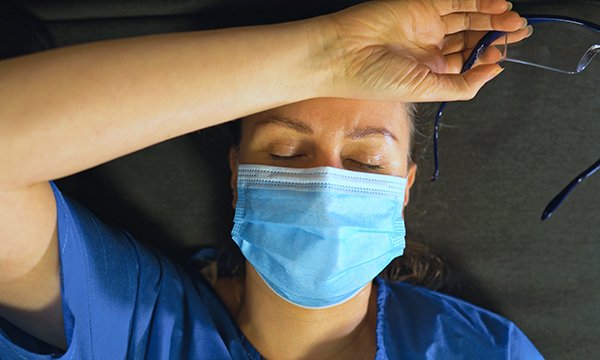Renewed calls to add long-COVID to list of occupational diseases

Nurses with long-COVID ‘doubly let down’ as government fails to follow occupational diseases recommendation made by IIAC a year ago, unions say

Long-COVID must be classified as an occupational disease to ensure nurses and other healthcare workers who contracted COVID-19 at work can access more financial support, say healthcare unions.
In a letter to the Department for Work and Pensions, the RCN and British Medical Association (BMA) urged the government to act quickly to better support those suffering the ‘debilitating’ effects of long-COVID, some of whom are unable to work as a result.
Government urged to reclassify long-COVID to ensure access to financial support
It comes a year after the Industrial Injuries Advisory Council (IIAC) published evidence showing a significantly increased risk of COVID-19, subsequent illness and death for health and social care workers. It recommended that five specific conditions resulting from complications of COVID-19 should be added to the list of prescribed occupational diseases for which benefit is payable.
The unions say the government has not yet responded to the paper. They say it is ‘crucial’ the government acts on the recommendations to ensure healthcare workers with long-COVID can receive industrial injuries disablement benefit.
Thousands of NHS staff with long-COVID have been left without sick pay
RCN chief nurse Nicola Ranger said: ‘Nursing staff tell us their lives have been forever changed by long-COVID. Its physical impact coupled with long-term financial insecurity is causing them continued worry.
‘They have been doubly let down by this government, which first failed to provide adequate protection against a deadly virus and subsequently left thousands unsupported while facing the often debilitating consequences of long-COVID.’
Thousands of nurses had this entitlement cut after the government ended special sick pay to support NHS staff off work with COVID or long-COVID. After the provisions were scrapped last year, many on a six-month transition period saw their payments end early this year.
Nurses have ongoing concerns over inadequate PPE
An RCN member survey conducted during the pandemic found more than a third of respondents felt under pressure to care for patients with suspected or confirmed cases of COVID-19 without adequate personal protective equipment (PPE). The situation was significantly worse for black and minority ethnic staff, more than half of whom felt pressure to work without the correct PPE.
A government spokesperson said it was carrying out a detailed assessment of the IIAC recommendations.
‘We continue to support the NHS workforce with sickness absence, and NHS terms and conditions provide generous support for NHS staff with up to six months' full pay and six months' half pay, depending on length of service,’ the spokesperson said.
In other news

